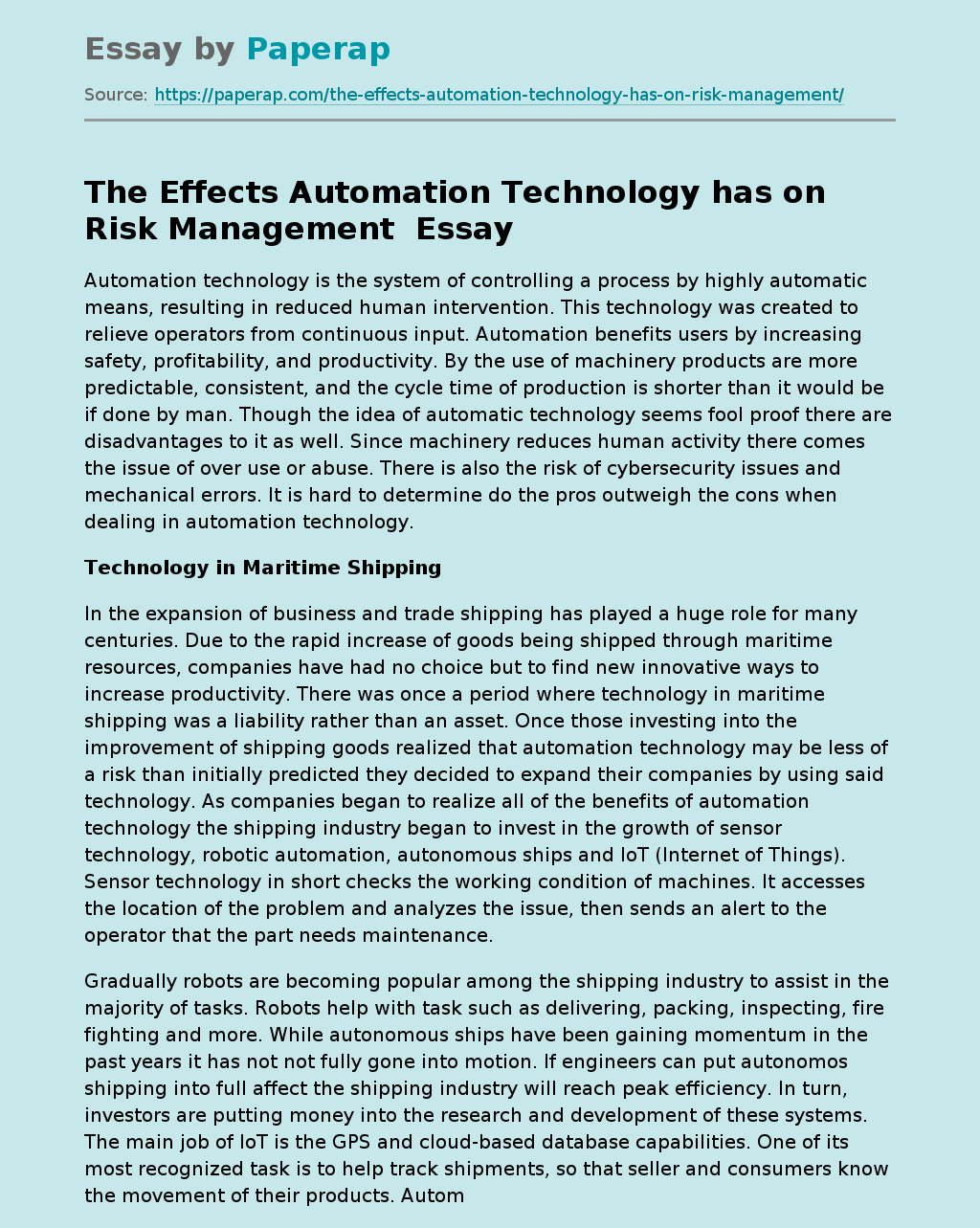The Effects Automation Technology has on Risk Management
Automation technology is the system of controlling a process by highly automatic means, resulting in reduced human intervention. This technology was created to relieve operators from continuous input. Automation benefits users by increasing safety, profitability, and productivity. By the use of machinery products are more predictable, consistent, and the cycle time of production is shorter than it would be if done by man. Though the idea of automatic technology seems fool proof there are disadvantages to it as well. Since machinery reduces human activity there comes the issue of over use or abuse.
There is also the risk of cybersecurity issues and mechanical errors. It is hard to determine do the pros outweigh the cons when dealing in automation technology.
Technology in Maritime Shipping
In the expansion of business and trade shipping has played a huge role for many centuries. Due to the rapid increase of goods being shipped through maritime resources, companies have had no choice but to find new innovative ways to increase productivity.
There was once a period where technology in maritime shipping was a liability rather than an asset. Once those investing into the improvement of shipping goods realized that automation technology may be less of a risk than initially predicted they decided to expand their companies by using said technology. As companies began to realize all of the benefits of automation technology the shipping industry began to invest in the growth of sensor technology, robotic automation, autonomous ships and IoT (Internet of Things). Sensor technology in short checks the working condition of machines.
It accesses the location of the problem and analyzes the issue, then sends an alert to the operator that the part needs maintenance.
Gradually robots are becoming popular among the shipping industry to assist in the majority of tasks. Robots help with task such as delivering, packing, inspecting, fire fighting and more. While autonomous ships have been gaining momentum in the past years it has not not fully gone into motion. If engineers can put autonomos shipping into full affect the shipping industry will reach peak efficiency. In turn, investors are putting money into the research and development of these systems. The main job of IoT is the GPS and cloud-based database capabilities. One of its most recognized task is to help track shipments, so that seller and consumers know the movement of their products. Automation technology has some extremely advanced capabilities that could not even be imagined not even half a century ago. Today is an age where technology is what we rely on to complete task that were once done by man and not thought before. This could be looked at as an amazing accomplishment or something that we should be concerned about.
Effects of Heavy Reliance on Technology
The heavy reliance on automation in the shipping industry has been brought into question. Those who use technology have begun to misuse and heavily rely on it. In the recent years machinery has so advanced that people rely on it to make decisions and control processes (automation). To the extent that engineers have been working on a way to get self guided cargo ships out to sea while it seems a great and innovative idea there will be trial and error. Error is is very likely to occur due to unanticipated situation occur and with cost of those errors will be result in hundreds of thousands of dollars lost. That is the risk companies take when looking for more efficient ways to ship products. Those are also the losses that prevented the shipping industry from advancing forward for many year.
The other forms of machinery that has become popular today has cons as well alongside all of the pros. For example sensor technology is in charge of checking all the other machines to see if they are running properly. It is vital that there are specialist that know how to do the same tasks as the machines in case of malfunctions. If the user puts too much trust in sensory devices there is a chance that a malfunctions will go unnoticed and there would be a domino affect of all other machines dependent on the function of one. It is important to check manually as well as trusting the technology.
The use of robots are another cause for concern when discussing the risk of automation technology. Robots work with various components of the productions that gets cargo from point A to point B. When companies rely solely of machines to do most of the work that reduces the amount of employees but most if not all of the work is being completed by machines. Without employees when mechanical errors do occur it is harder to resolve as well as continue production. In the the shipping industry it is essential that they are going fast paced and with machine that companies rely on down they lose money.
Conclusion
Though there may be risk in maritime logistics the majority of the time the benefit outweighs the risk. With the rising volume of cargo being shipped finding cheap and efficient ways to transport in essential to companies. Though there are various sources claiming that automatic technology it helps
The Effects Automation Technology has on Risk Management . (2021, Dec 13). Retrieved from https://paperap.com/the-effects-automation-technology-has-on-risk-management/

